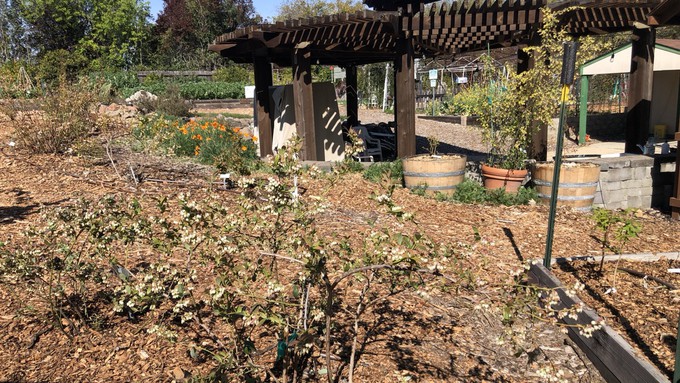
Preparing for spring and summer, Sacramento County master gardeners host free event

Expect the weather to be bright and warm this Saturday for the Open Garden at the Fair Oaks Horticulture Center. The Berry Garden, in foreground, will be the focus of a mini talk on soil pH levels and applying sulfur. Kathy Morrison
From 9 a.m. to noon Saturday, March 16, the UCCE master gardeners of Sacramento County will be out in force to teach by doing – rain or shine. (Fortunately, Saturday is expected to be warm and sunny.)
“Open Gardens are informal free events where you roam the gardens, watch what we are doing, see what we are growing and ask questions,” explain the master gardeners.
Join dozens of master gardeners “among native trees, culinary herbs, raised vegetable beds, a citrus grove and more,” they say. Find out what you should be doing in your own garden by watching and questioning these local experts.
It’s also a wonderful opportunity to get answers to perplexing plant and pest questions.
“Bring samples of your problem plants, bagged insects and questions to the ‘Ask the Master Gardeners’ information table,” they add. “Get one-on-one advice based on the most recent research-based sustainable practices.”
Interested in composting? Learn which bin is right for your space and needs. Get advice on worm composting, too.
Two “mini-talks” are planned:
* Planting for summer color and propagating perennials; and
* How to measure and adjust pH levels with soil sulfur for berries. (This is especially important for blueberries.)
Fair Oaks Horticulture Center is located at 11549 Fair Oaks Blvd., Fair Oaks.
The next Open Garden is scheduled for Wednesday morning, April 17.
For more details and directions: https://sacmg.ucanr.edu/.
Comments
0 comments have been posted.Sacramento Digs Gardening to your inbox.
Sites We Like
Garden Checklist for week of July 21
Your garden needs you!
* Keep your vegetable garden watered, mulched and weeded. Water before 8 a.m. to reduce the chance of fungal infection and to conserve moisture.
* Feed vegetable plants bone meal, rock phosphate or other fertilizers high in phosphate to stimulate more blooms and fruiting. (But wait until daily high temperatures drop out of the 100s.)
* Don’t let tomatoes wilt or dry out completely. Give tomatoes a deep watering two to three times a week.
* Harvest vegetables promptly to encourage plants to produce more. Squash especially tends to grow rapidly in hot weather. Keep an eye on zucchini.
* Pinch back chrysanthemums for bushy plants and more flowers in September.
* Remove spent flowers from roses, daylilies and other bloomers as they finish flowering.
* Pinch off blooms from basil so the plant will grow more leaves.
* Cut back lavender after flowering to promote a second bloom.
* It's not too late to add a splash of color. Plant petunias, snapdragons, zinnias and marigolds.
* From seed, plant corn, pumpkins, radishes, winter squash and sunflowers.